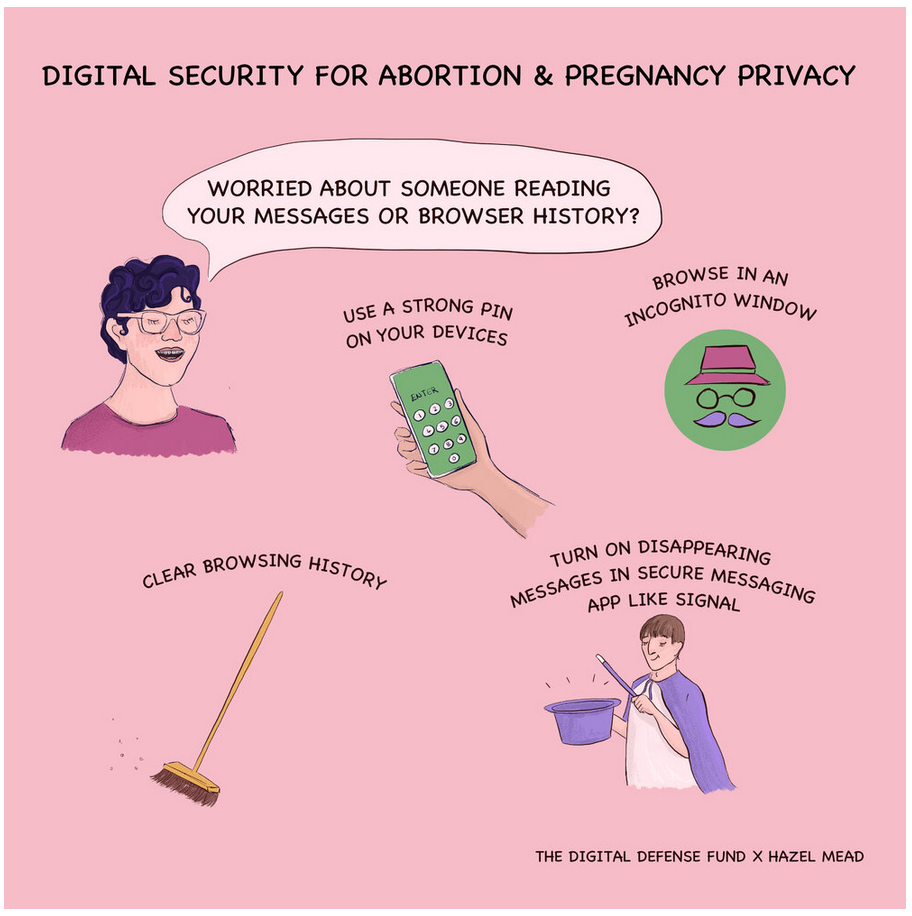Privacy in a post-Roe America (Privacy News, June 24)
Including ways to take action, as well as Reproductive Justice, legal, and technical perspectives.

Earlier today the Supreme Court overturned Roe v. Wade, removing the constitutional right to abortion. In the 1973 Roe ruling, the Supreme Court had said the Fourteenth Amendment’s Due Process Clause “protects against state action the right to privacy, including a woman’s qualified right to terminate her pregnancy.” The current Supreme Court disagrees. As Paris Hatcher of Black Feminist Future points out, there is hardly any more fundamental human right than the ability to control what happens to our bodies.
TAKE ACTION: One of the most pivotal things you can do at this moment is to support abortion funds. Abortion funds provide funding, travel, lodging, and other wrap-around supports. Donations to National Network of Abortion Funds are split between abortion funds around the country.
Today’s decision abandons nearly 50 years of precedent & marks the first time in history that the Supreme Court has taken away a fundamental right.
— SisterSong (@SisterSong_WOC) June 24, 2022
The Court’s decision will likely lead to half of U.S. states immediately taking action to ban abortion outright.
Most of the "trigger laws" criminalizing abortion once Roe is overturned don't go into effect immediately. Lauren Rankin (author of Our Bodies on the Line) has a Twitter thread with details.
The Supreme Court just overturned Roe v. Wade and Planned Parenthood v. Casey. This is devastating, an absolute national tragedy. But know that this isn't the end of this fight, that activists and organizers are diligently working to continue access to safe abortion. A thread:
— Lauren Rankin (@laurenarankin) June 24, 2022
TAKE ACTION: Stephanie Baer's Here’s How To Fight For Abortion Rights Now That Roe V. Wade Is Gone on Buzzfeed and Meg O'Connor's Here’s How You Can Help People After Roe on The Appeal have suggestions about what to do – and what not to do.
By contrast, here on the West Coast, the Governors of Washington, Oregon, and California have just announced Multi-State Commitment to defend access to reproductive health care, including abortion and contraceptives, and committed to protecting patients and doctors against efforts by other states to export their abortion bans to our states.
I'd like to note that Thomas wants to "revisit" other unenumerated rights - same sex marriage, contraception, and other private consensual sexual acts (Lawrence case).
— Bärí A. Williams, Esq. (@BariAWilliams) June 24, 2022
What was missing, you ask? Interracial marriage. Wonder why that is. /s/ Cherrypicking. It's on-brand. #SCOTUS
A lot of other protections also depend on the privacy rights that SCOTUS just gutted. As Clarence Thomas made clear in his dissent, by the same logic the Supreme Court is also likely to end the right to contraception (overruling Griswold), same-sex marriage (Obergfell), and same-sex sexual activity (Lawrence).
And of course, ending the right to abortion will also have a huge impact on informational privacy.* A few links:
- Digital Defense Fund's Guide to Abortion Privacy has some excellent suggestions about how to protect yourself if you're pregnant and/or looking for information about an abortion. Tom Read's How to Keep Your Abortion Private in 2024 is a good complement, with some of the same points as well as some additional suggestions.
- EFF's What Companies Can Do Now to Protect Digital Rights In A Post-Roe World, by Corynne McSherry and Katharine Trendacosta', looks at what people creating software and systems need to keep in mind.
- Anti-Abortion Centers’ Databases Could Be Weaponized Post-Roe, by Abigail Adams and Vera Bergengruen on Time, looks at how fake "pregnancy crisis centers" violate abortion seekers' privacy. As we discussed a few days ago, Google contributes to the problem by sending people searching for abortions to these fake clinics.
TAKE ACTION: Tell Google to stop profiting from anti-abortion disinformation using Center for Countering Digital Hate's form. - The Impotence of the Fourth Amendment in a Post-Roe World, on Lawfare, looks at legal aspects of the surveillance architectures of this new world.
- Surveillance Technology Oversight Project and Rad Tech hosted a discussion yesterday with JoyceDellinger and Hayley Tsukayama of EFF on Reproductive Freedom Under Surveillance
S.T.O.P. x RadTech: Reproductive Freedom Under Surveillance https://t.co/nItgMYS6TD
— S.T.O.P.—Surveillance Technology Oversight Project (@STOPSpyingNY) June 23, 2022
* Privacy isn’t in the Constitution – but it’s everywhere in constitutional law, by Scott Skinner-Thompson on The Conversation, is a good short introduction to the distinctionn between "decisional privacy" (also known as "autonomy privacy") and "informational privacy". As Kate Bertash of Digital Defense Fund said at Color of Surveillance earlier this week, you can't have one without the other.
Image Credit: from Digital Defense Fund's Guide to Abortion Privacy .
Image description: The image is titled “Digital Security for Abortion and Pregnancy Privacy.” A white person with braces and short dark curly hair says, “Worried about someone reading your messages or browser history?” Small images provide advice. A hand holds a phone with a green lock screen displaying the word “Enter” and a dial pad. Text reads: “Use a strong PIN on your devices.” A green circle in a pink background contains an illustration of a purple mustache, black glasses, and a pink hat. Text reads: “Browse in an incognito window.” A white magician with brown hair wearing a white shirt and purple cape uses a purple wand to make a purple hat’s contents disappear. Text reads: “Turn on disappearing messages in secure messaging app like Signal.” A brown broom sweeps dust. Text reads: “Clear browsing history.” The image is signed “The Digital Defense Fund x Hazel Mead.”
